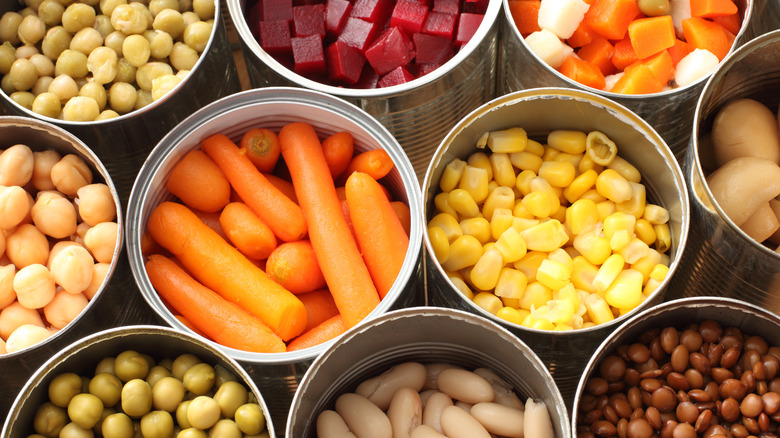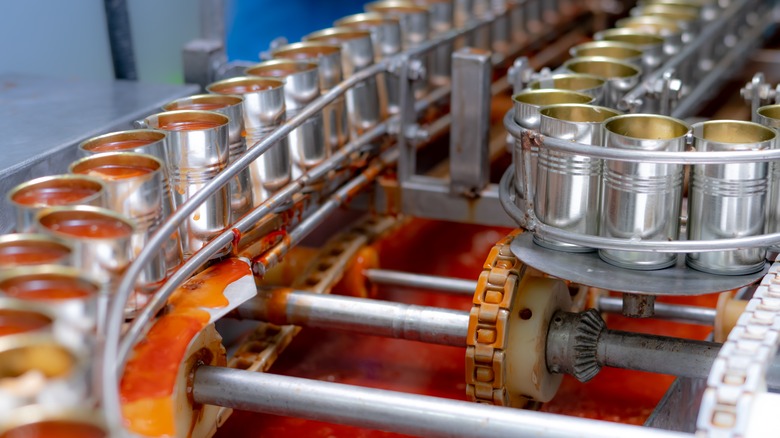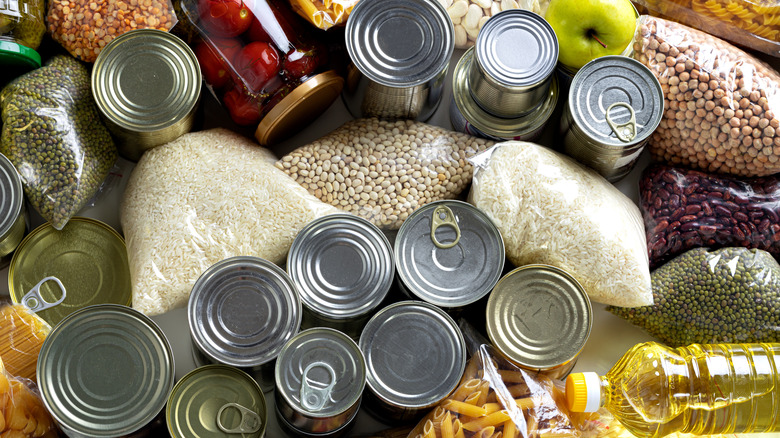This Is Why Canned Food Lasts So Long
Besides prepping for doomsday, having a well-stocked canned goods section in your pantry means instant access to ingredients for a quick weeknight meal. You can revive soggy canned veggies for a dinner side dish or keep some tinned fish around for a classy appetizer or charcuterie board, for instance. But if you pull out an expired can from the dusty depths of your pantry, you might be wondering if it's still good to eat. Let's say the best-by date is from well over a year ago. You've heard the stories about botulism and you've got too much going on for botulism. Should you risk it?
Shelf-stable foods, which include canned vegetables, fish, and meat are all technically processed foods. Done right, the canning process is sterile and involves cooking food at 250 degrees Fahrenheit, according to the USDA. As the vessels (like an aluminum can or glass jar) cool, a vacuum seal forms and the food is safely tucked away inside, separated from the outside world.
Considering all of that, that can of green beans from 2019 should be fine to eat, especially if it's been kept in a cool and dry location. Still, our minds and guts probably say, "No, thank you," at the prospect of eating five-year-old canned beans. Science, however, has a different answer.
A sterile environment and high temperatures help ensure longevity
The high temperatures used in the canning process not only vacuum seal a vessel but should also kill off any potentially harmful microorganisms inside. If done correctly in a sterile environment, canned meat and veggies can last up to five years, if not indefinitely (via USDA). Once opened, though, the clock starts ticking. That previously canned food should then be stored in clean containers in the refrigerator.
However, while a can of beans can technically last indefinitely, you may not want to eat it decades down the line. The further past the expiration date you open the can, the more likely it is that you'll notice a decrease in quality, whether that's in terms of taste, texture, or color.
A rule of thumb to keep in mind is that acidic foods, like tomato sauces, pineapples, or salsas, will maintain their quality for up to 18 months after canning, but they can break down the can itself the longer they're left to sit. Non-acidic foods like meat, fish, and vegetables, will last up to five years, as per the USDA. If you're still not sure your canned foods are still good, there are a few key signs to look out for even before you get the can opener.
Look out for signs of spoilage before you open the can
Thanks to technology and industrialization, canning foods is largely sterile and safe. Yet, though it's rare, sometimes the C. botulinum bacteria or its spores find their way into canned foods. The problem with botulism is that you can't immediately see it, smell it, or taste it, so you may not know of its presence until you or someone else gets sick. That's why you shouldn't even taste questionable food. To prevent accidental botulism poisoning, there are a few signs to look out for.
First, consider how you store your canned goods. Your canned food should be kept away from damp basements, under sinks, or next to the stove. And if your cans were stored at incorrect temperatures, like over 100 degrees Fahrenheit, the food inside will likely start to spoil. Finally, take a good look at the can and run your fingers around it. If the can is bulging, badly dented, rusted, or leaking, just throw it away.
Sometimes the can may look completely fine, but when you open it, the contents tell a different story. Look out for nasty smells, fluffy mold, or liquid spurting out when the can is opened, as these are all signs of spoilage. The best thing is to go with your instinct — if you don't think you should eat it, play it safe and discard the canned food.


